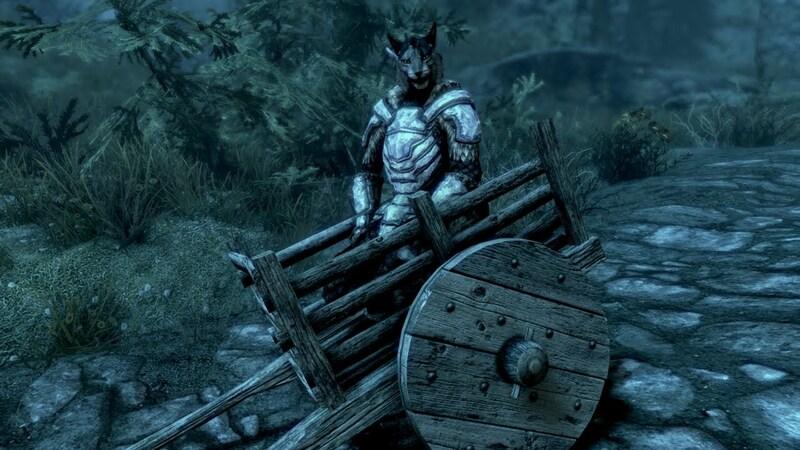I recently had an idea for a new video game mechanic. In many game genres, there is a common trope where the protagonist goes out into the world and does exciting action things which often result in surplus equipment or other valuables. You might kill a dragon which has a valuable set of scales. Or you kill a few enemy soldiers. In both of those cases the normal way the situation is handled is by giving the player the chance to "loot" the scene. But how can it make any sense to head back into town with a half dozen sets of weapons and full suits of armor, or a complete dragon hide? Staggering back thus encumbered might be plausible if that’s all you needed to do, but there will be obstacles, other monsters and other things to discover. You know, the stuff that makes the game have a plot.
Currently there are a few strategies to deal with this. One is to severely limit what you can loot from the set of what one would reasonably expect. Was everyone you just fought wearing socks? Yes? Yet the game is not going to let you loot socks. It limits things to just the salient weapons or even just some random items drawn from a loot table.
The other main strategy — and they’re not mutually exclusive — is to just let the player carry an absurd amount of stuff. Related to that is discounting how much items weigh. A champion of those strategies would be the deliberately fanciful Minecraft where players can carry nearly 10 billion kg! (I actually disagree with that analysis because I don’t assume nondestructive crafting in Minecraft. And a player can carry only 36 hats before collapsing under their weight. But the point of the analysis is still quite correct and illustrative.)
But what if you’re going for a game with maximal immersion and fidelity. I can not recall ever seeing this problem addressed realistically. How might a game do better with this problem?
I imagine an open world game like Skyrim or Borderlands or Fallout or Witcher3 or or Red Dead Redemption or even GTA handling this problem in the following way. Once a player encounters a situation where collecting an absurd amount of stuff is possible, they have the option to shuttle it to a cache, basically a hiding place. They then make a note of that on their maps.
How this works is that back in the village among safe and helpful NPCs, the player can then choose to sell these notes to various salvage operators. These guys are not professional dragon slayers. They are just professional movers of stuff. If you tell them exactly where to go and what to find — with assurances that the local monsters are all dead! — they can then make the implausible portaging plausible. Why bother bringing all this stuff back to town to sell, when the shopkeeper you’re planning to sell things to could also be handling the moving? You’re this world’s messiah — outsource a bit!

Besides making games less unrealistic, what’s cool about this mechanic is that it can have a lot of tunable elements which could be interesting for the player. For example, let’s say you come to town and tell a salvager that you have buried a chest of gold that you want to sell and reveal the general area it’s in. All of this can be done by selecting from a menu that is essentially your notes. At this point the salvager has to decide if he trusts you enough to go attempt to get your stuff. You could have a system where you build trust slowly. Maybe at first you can only hire shady itinerant movers who commonly set out after your gold and then disappear forever, maybe stealing your treasure or maybe failing and its still there waiting. Or maybe the earnest recovery effort is robbed by bandits or their ship is dashed on the rocks in a storm. These kinds of problems set up new missions where you, the hero, can go salvage the salvage operation or hunt down perfidious cheaters.
As you do more business, you might be able to pay, up front, someone in a permanent location to go fetch your stuff. They have a good reputation and will likely work to keep it. Eventually you are trustworthy enough that these professional salvagers will simply pay you coin for your notes and the transaction is complete — you have gold in your pocket from some lootable adventure without the clumsy impossible process of hauling that loot.

You could imagine that different towns would have different reputations. You could trick some of these merchants if they aggravate you or you don’t mind burning your reputation there. They may charge more commission if the trip is long or requires visiting dangerous places. There can be a whole complex dynamic to work out optimal routes for multiple pickups, a famously tricky travelling salesman problem. They might even tell you that they could loot the cave in the elven ruins if it weren’t for the trolls that lived nearby — prompting you to go kill three stone trolls and add their loot to the shipping manifest. This would make it plausible to capture entire ships or wagons or cars and leave them for others to sensibly pick up and liquidate.
There might be interesting dynamics in how long it takes to get paid or take possession of the item back in town, maybe timed for correct leveling. You could have a system that allows players to basically act as scouts for some things; for example, they might come back and sell to a craftsman the general location of a crafting ingredient (e.g. mine’s ore vein or rare plant grove or animal sighting, etc). Or even "loot" entire buildings or towns by delivering to the right people the information that it is now safe to occupy.
You could hire trustworthy movers to go to your remote base and retrieve needed items from storage for some particular mission. A lighter version of this would be where the player has to haul all of the loot to major hubs which functionally act as railheads.
Maybe have different levels of caching. A poorly stashed hoard may be found by someone else by the time your mover arrives sparking all kinds of interesting tension. Maybe if this is a common problem the player can improve their odds by dividing the loot and performing multiple hiding operations. Maybe there could be a dynamic where poor hiding results in the mover not being able to find the loot; the loot is still there, but the mover is too annoyed to try again. Or maybe that problem doesn’t result from poor hiding but rather careful hiding!
By having a system like this, players can obsessively loot a place and yet the carrying weight limit can still be set at something sane. It opens the door for all kinds of intrigue. You can duly approve and appreciate all the junk items you’re taking from the battlefield sets without having them clutter your real working inventory. And if you come across an item that’s a keeper, but you can’t take it now, it can be handled later — by someone else!
Some may object that this makes the game too complicated, like running a logistics business. But I’m afraid that fast travel wagon has already rolled out of the city gates. Have a look at this hilarious scene CD Project Red scripted into Witcher3 to troll people who run mods to give themselves unaccountable wealth.
Clearly players can enjoy such bookkeeping details!